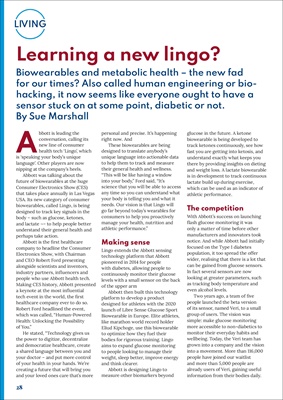
28
LIVING
Learning a new lingo?
Biowearables and metabolic health - the new fad
for our times? Also called human engineering or biohacking,
it now seems like everyone ought to have a
sensor stuck on at some point, diabetic or not.
By Sue Marshall
Abbott is leading the
conversation, calling its
new line of consumer
health tech 'Lingo', which
is 'speaking your body's unique
language'. Other players are now
nipping at the company's heals.
Abbott was talking about the
future of biowearables at the huge
Consumer Electronics Show (CES)
that takes place annually in Las Vegas
USA. Its new category of consumer
biowearables, called Lingo, is being
designed to track key signals in the
body - such as glucose, ketones,
and lactate ¬- to help people better
understand their general health and
perhaps take action.
Abbott is the first healthcare
company to headline the Consumer
Electronics Show, with Chairman
and CEO Robert Ford presenting
alongside scientists and inventors,
industry partners, influencers and
people who use Abbott health tech.
Making CES history, Abbott presented
a keynote at the most influential
tech event in the world, the first
healthcare company ever to do so.
Robert Ford headlined the event,
which was called, "Human-Powered
Health: Unlocking the Possibility
of You."
He stated, "Technology gives us
the power to digitize, decentralize
and democratize healthcare, create
a shared language between you and
your doctor - and put more control
of your health in your hands. We're
creating a future that will bring you
and your loved ones care that's more
personal and precise. It's happening
right now. And
These biowearables are being
designed to translate anybody's
unique language into actionable data
to help them to track and measure
their general health and wellness.
"This will be like having a window
into your body," Ford said, "It's
science that you will be able to access
any time so you can understand what
your body is telling you and what it
needs. Our vision is that Lingo will
go far beyond today's wearables for
consumers to help you proactively
manage your health, nutrition and
athletic performance."
Making sense
Lingo extends the Abbott sensing
technology platform that Abbott
pioneered in 2014 for people
with diabetes, allowing people to
continuously monitor their glucose
levels with a small sensor on the back
of the upper arm
Abbott then built this technology
platform to develop a product
designed for athletes with the 2020
launch of Libre Sense Glucose Sport
Biowearable in Europe. Elite athletes,
like marathon world record holder
Eliud Kipchoge, use this biowearable
to optimize how they fuel their
bodies for rigorous training. Lingo
aims to expand glucose monitoring
to people looking to manage their
weight, sleep better, improve energy
and think clearer.
Abbott is designing Lingo to
measure other biomarkers beyond
glucose in the future. A ketone
biowearable is being developed to
track ketones continuously, see how
fast you are getting into ketosis, and
understand exactly what keeps you
there by providing insights on dieting
and weight loss. A lactate biowearable
is in development to track continuous
lactate build up during exercise,
which can be used as an indicator of
athletic performance.
The competition
With Abbott's success of launching
flash glucose monitoring it was
only a matter of time before other
manufacturers and innovators took
notice. And while Abbott had initially
focused on the Type 1 diabetes
population, it too spread the offer
wider, realising that there is a lot that
can be gained from glucose sensors.
In fact several sensors are now
looking at greater parameters, such
as tracking body temperature and
even alcohol levels.
Two years ago, a team of five
people in launched the beta version
of its sensor, named Veri, to a small
group of users. The vision was
simple: make glucose monitoring
more accessible to non-diabetics to
monitor their everyday habits and
wellbeing. Today, the Veri team has
grown into a company and the vision
into a movement. More than 116,000
people have joined our waitlist and
more than 5,000 people are already
users of Veri, gaining powerful signals
of their bodies every day.